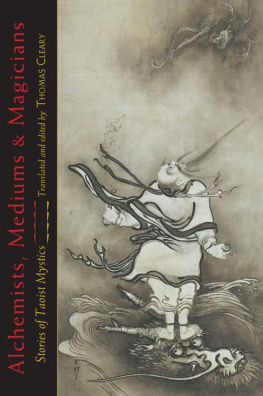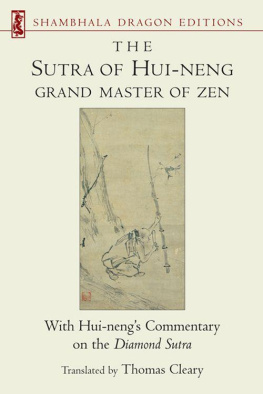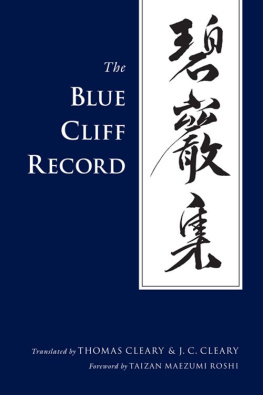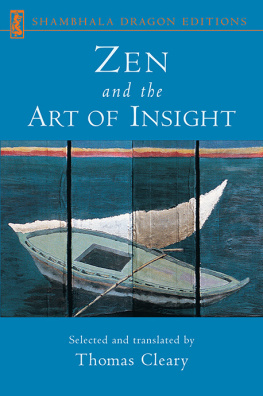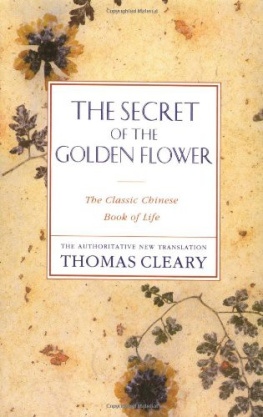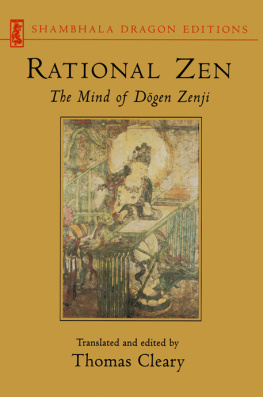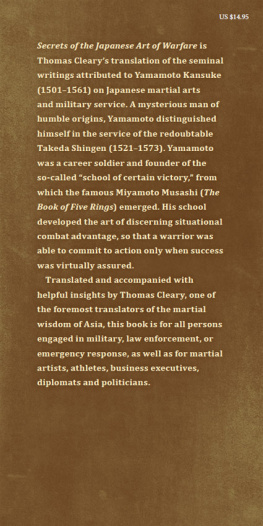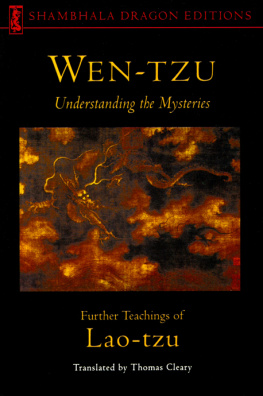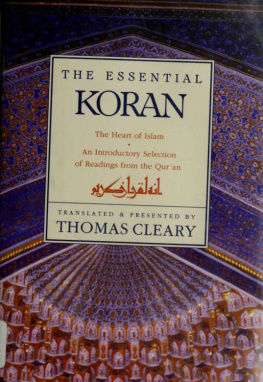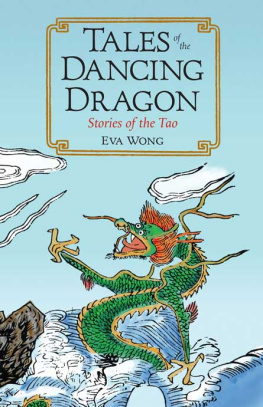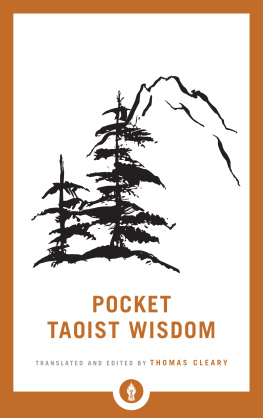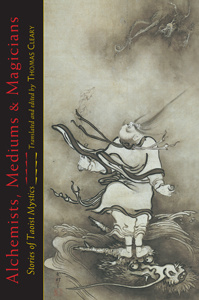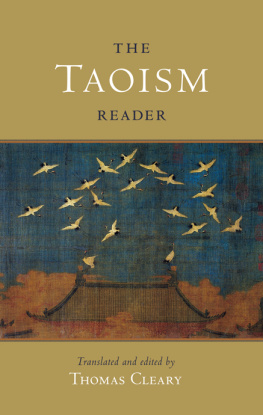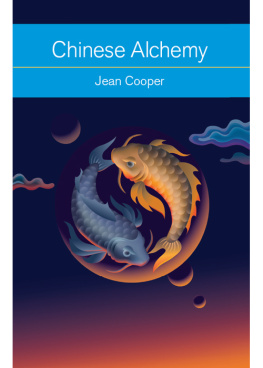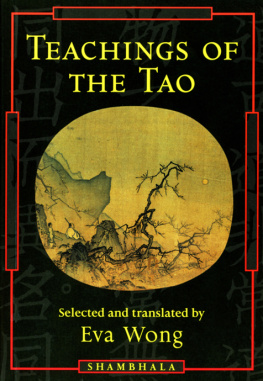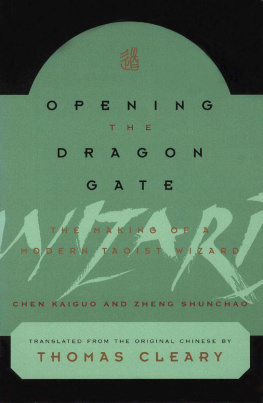ALCHEMISTS, MEDIUMS, AND MAGICIANS
Stories of Taoist Mystics
TRANSLATED AND EDITED BY
T HOMAS C LEARY

Shambhala
Boston & London
2011
SHAMBHALA PUBLICATIONS, INC.
Horticultural Hall
300 Massachusetts Avenue
Boston, Massachusetts 02115
www.shambhala.com
2009 by Thomas Cleary
All rights reserved. No part of this book may be reproduced in any form or by any means, electronic or mechanical, including photocopying, recording, or by any information storage and retrieval system, without permission in writing from the publisher.
Library of Congress Cataloging-in-Publication Data
Alchemists, mediums, and magicians: stories of Taoist mystics / translated and edited by Thomas Cleary.
p. cm.
Includes bibliographical references.
eISBN 978-0-8348-2166-8
ISBN 978-1-59030-659-8
1. TaoistsChina. 2. TaoismChinaHistory.
I. Cleary, Thomas F., 1949 II. Title: Stories of Taoist mystics.
BL1910.A53 2009
299.514092251dc22
[B]
2008032446
CONTENTS
One of the most persistent themes in esoteric thought all over the world is the idea of a secret society surreptitiously superintending human affairs. Such a role has been suggested or suspected of various organizations, both real and imagined, throughout history. The Nine Unknowns of India, the Builders of Egypt, and the Druids of Europe have all been portrayed in this way at various times, as have later groups such as the Masons, Rosicrucians, and Illuminati. Where secular leadership assumed a cultic character, moreover, suspicions of occult connections also came to constitute a commonplace concern in the context of political, military, and economic interests.
Secret societies have played a powerful role in Chinese history, even to the point of organizing open revolt and assuming local functions of secular government. As elsewhere in the world, emperors and kings of all eras in China sought the support of such groups and the counsel and instruction of their masters and adepts. Some associations, to be sure, if not imaginary, have been so secret that their existence outside folklore is scarcely suspected, yet sources of special teaching over the ages, however obscure their actual origins, have undeniably produced many elevated minds and extraordinary personalities that diffused evolutionary ideas of advanced human capacities.
Alchemists, Mediums, and Magicians is a collection of sketches from Chinese history portraying more than one hundred of the remarkable individuals associated with exceptional knowledge, uncommon artistry, and spiritual leadership over a period of more than two millennia. Compiled under the title Mystic History by Zhang Tianyu, a Taoist priest in the fourteenth century, this collection introduces a broad range of personalities, professions, and pastimes of Chinas esoteric elite, from the most illustrious to the utterly obscure. Among them are people who appear to the world as philosophers and scholars, strategists and statesmen, recluses and courtiers, magicians and mediums, philanthropists and educators, alchemists and physicians, seers and soothsayers, priests and paupers, artists and poets.
Alchemists, Mediums, and Magicians introduces an expansive view of the many faces of Taoism and its intimate connection with the core composition of Chinese culture and society. Particular attention is paid to the masters of the Taoist grotto governments that controlled entry into the cave systems where supernal powers were invoked and dangerous mystical exercises were carried out employing powerful consciousness-altering techniques, including sensory deprivation, incantation, visualization, and concentration.
These secret societies also projected themselves as representative organs of an esoteric government of ascended adepts commanded by an occult hierarchy of immortals, portrayed as realized people of the past who had disappeared but not died. A parallel political practice of imperial beatification, sanctification, and posthumous court appointment of such figures typically included formal appeals to them for divine intercession and assistance from on high.
Alchemists, Mediums, and Magicians features stories from the eleventh century B.C.E. to the thirteenth century C.E. , following the course of orthodox dynastic history. Seeking to renew a unifying link between the esoteric and exoteric dimensions of traditional Chinese culture, in his introduction Zhang Tianyu invokes the father of Chinese historiography for a working definition of Taoism to outline the design of this collection:
The Grand Historian wrote, Taoism has peoples vital spirit unified, acting appropriately without formality, sufficing all people. As for the practical methods, based on the universal order of yin and yang, taking what is good in Confucianism and Moism, distilling the essences of logic and law, they move with the times, change in response to the concrete, establish customs and carry on business in any way appropriate. The instructions are simple and easy to practice; little is done, but with much effect.I have been inspired to reflect that there must have been such people, but their obscurity has prevented the assertion of the Grand Historian to gain credence in later ages. So I determined to search for them among the people of old. From Lao-tzu on down, Ive drawn on their literature on the Way and on virtue and arranged them by categories, as it seems that Ive found such people.In ancient times, when Chuang-tzu set forth the arts of the Way all over the land, he honored Confucius but did not conform; now, emulating his intent, here I make an anthology on Lao-tzu without conformity, as the epitome of honor.Yang Ziyun The Grand Historians proposed definition is what I hope to emulate.
. Sima Qian (ca. 14590 B.C.E.), called the Grand Historian, was one of the most influential scholars of all time.
. Yang Ziyun was Yang Xiong, a famous scholar of the Han dynasty.
. This statement encapsulates the key concern of this collection. It is addressed to the dichotomization of esoteric and exoteric studies and means to say, in essence, that mysticism is not really antisocial, as it is often imagined to be.
[ 1 ]
Taoist Virtue and Character
O FFICER X I
Officer Xi was a grandee of Zhou. Adept at inner studies, he regularly consumed vital essences and practiced secret charity. None of the people of his time knew him.
When Lao-tzu traveled west, Xi perceived his atmosphere in advance and knew a real human was going to pass through. Looking to stop him, he actually found Lao-tzu. Lao-tzu knew he was exceptional too, and wrote two works for him, on the Way and on virtue. Afterward he went into the Gobi Desert with Lao-tzu and ate black sesame seed. No one knows where he ended up.
Xi also wrote a book, in nine chapters, called Keeper of the Pass. called it murky and inconsistent, vast and very free, yet with models to make people cool and light, not making people crazy. Chuang-tzu also cites Xis saying, It is in oneself without abiding, reveals itself in forming things; like water in movement, like a mirror in stillness, like an echo in response, so indistinct it is as if not there, so still it seems clear. Those who assimilate to it harmonize, those who attain it lead; it never precedes people but always follows people.
Xi is famed as one of the great real people of old. He was originally called Master Wenshi, Beginner of Culture.
O FFICER G UI
Officer Gui was styled Gongdu. He was a man of Taiyuan
Before Wenshi met Lao-tzu at Box Canyon Pass, in the times of King Kang and King Zhao of Zhou [10901002 B.C.E. ], he attained the Way and became the Real Human of Great Harmony.
D U Z HONG
Du Zhong was styled Xuanyi. He was a man of Gaojing. He is entitled the Real Human of the Absolute.
Next page
